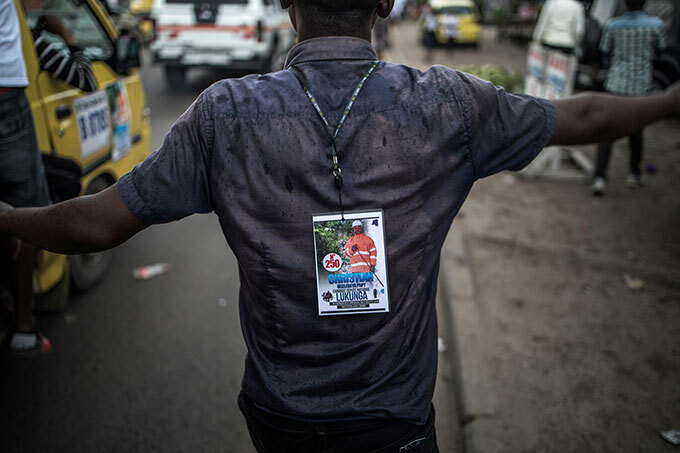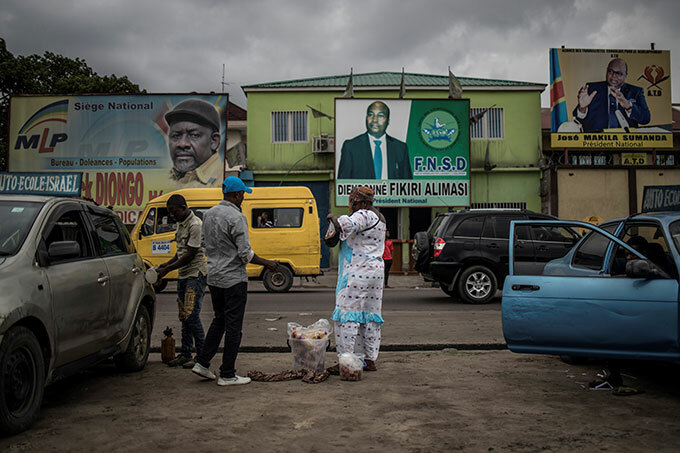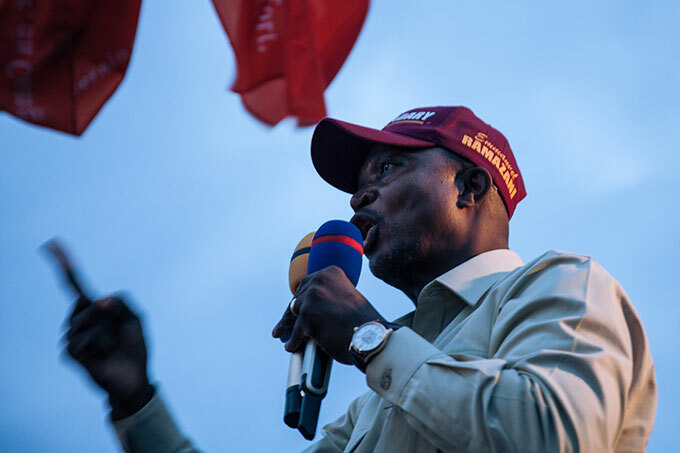DR Congo refugees put little faith in coming elections
But a few weeks ahead of the December 23 ballot, when voters will choose a successor to President Joseph Kabila, she left her home, fleeing across the border to Uganda.
PIC : A crowd campaigns under a downpour for a candidate to the Congolese parliament, Christian Ngelebeya Papy, on December 17, 2018, in Kinshasa. - Democratic Republic of Congo goes to the polls on December 17 in elections which could see the country emerge from 17 years of conflict-ridden rule under the incumbent controversial president. At stake is the political stewardship of a mineral-rich country that has never known a peaceful transition of power since independence from Belgium in 1960. ( AFP)
DRC POLLS
They may have fled their homes six months or as much as 20 years ago, but few of them have any faith in the upcoming elections in Democratic Republic of Congo.
Until recently, Immaculate Nyakato, 65, lived in Ituri, one of DR Congo's eastern provinces that borders Uganda.
For a long time, she put up with the violence that has blighted the gold-rich region.
But a few weeks ahead of the December 23 ballot, when voters will choose a successor to President Joseph Kabila, she left her home, fleeing across the border to Uganda.
A member of the Hema minority, she felt threatened by the Lendu, another ethnic group.
They had come in the night and put a mark on her door and those of her neighbours, she told AFP. That was all the warning she needed.
Nyakato gathered her things and what little money she had and crossed to Kyangwali, a refugee camp in Uganda on the other side of Lake Albert.

"If there is still war, the elections won't make a difference," she remarked.
Fleeing the violence
She is one of around 123,000 refugees who have fled across the border in recent months.
Another is Kabagambe Mahanga, who until last month lived a peaceful life working as a baker in Jina, a village just north of Ituri's capital, Bunia.
"People in Jina were scared because they were burning houses at night," he explained, saying the Lendu were known for attacking their enemies with machetes.
Mahanga quickly left, taking muddy paths and trails to reach the shores of Lake Albert, where he made the perilous 30-kilometre (18-mile) crossing to the other side.
"On the boat, I thanked God I was leaving the war and coming to Uganda," he recalled.
"But it was so overloaded, it moved slowly and I thought we would die."
He is still following the developments back home, particularly the controversy over the touch-screen voting terminals, whose use has been denounced by many as an open door for fraud.

A woman sells beverages to driving schools tutors as electoral posters are seen in the background in Kinshasa, Democratic Republic of the Congo, on December 17, 2018. - The country is on edge ahead of the December 23 vote to replace President Joseph Kabila, who has ruled the resource-rich nation since 2001. (AFP)
"I'm happy if there are elections to allow people to vote," he said.
But it would be best if the vote went ahead "without machines".
'In war, elections mean nothing'
At the camp in Kyangwali, recent arrivals rub shoulders with Congolese refugees who have been there for years.
Many have little faith in Sunday's election.
"I'll always be Congolese but for me the elections are nothing," says 25-year-old Jerome Mugisa. "If there is war, elections are nothing."
A French-English translator, he arrived in Uganda with his parents during a wave of violence that ravaged Ituri between 1999 and 2003.
His parents later tried to go back. But not him.
Figures from the UN refugee agency UNHCR show there are currently 782,000 Congolese refugees being hosted in African countries.
By far the largest percentage have fled to Uganda, which is sheltering 284,000 of them -- more than a third.
Unlike people fleeing eastern countries like Sudan and Eritrea, Congolese do not usually attempt the perilous trek towards Europe.
 Emmanuel Ramazany Shadary, a presidential candidate, talks to a crowd of supporters during his election rally in Goma, North-Kivu, on December 16, 2018. - Tensions are rising in the vast, unstable country ahead of the December 23 election when voters will choose a successor to the President who has remained in power as a caretaker leader even though his second and final elected term ended nearly two years ago. (AFP)
Emmanuel Ramazany Shadary, a presidential candidate, talks to a crowd of supporters during his election rally in Goma, North-Kivu, on December 16, 2018. - Tensions are rising in the vast, unstable country ahead of the December 23 election when voters will choose a successor to the President who has remained in power as a caretaker leader even though his second and final elected term ended nearly two years ago. (AFP)
Instead, they seek refuge in one of the nine countries that border this vast central African country which covers some 2.3 million square kilometres (919,595 square miles).
For Jean-Bienvenu Likanzu-Mokolo from Kinshasa, safety meant fleeing across the Congo River to Brazzaville, capital of the neighbouring Republic of Congo.
Twin capitals, the Kinshasa is visible across the water from Brazzaville's southern districts -- which is why the 50-year-old prefers to stay in the northern part of the city.
"It's too painful to see Kinshasa," he says.
An associate of opposition heavyweight Jean-Pierre Bemba, a former warlord who went into exile in 2007, Likanzu-Mokolo fled Kinshasa a decade ago under cover of night, escaping in a wooden canoe.
Now head of an association of 15,000 DRC refugees, Likanzu-Mokolo had thought he could finally return home when Bemba announced his intention to run in the upcoming elections.
But with Bemba barred from running, Likanzu-Mokolo is now thinking of moving even further away.
Deprived of a vote
Deprived of voting rights, these refugees can only watch the vote from the sidelines, along with all their compatriots living elsewhere in the world.
"I can't vote because I am here in Zambia as a refugee, and it hurts me," said Martin Mputu Bakole, who used to live near Lubumbashi, DR Congo's second city which lies in the south-east, close to the Zambian border.
But 20 years ago he fled, and today he repairs watches in Lusaka.
Pierre-Marie Lukungu also left Lubumbashi in the 1990s for Lusaka. Today he is leader of the Congolese community in Zambia.
"From the time of independence up to this day, Congo has never had good elections," he said of a country which has never known a peaceful transition of power since independence from Belgium in 1960.
"Congo has never had a past president who is living. Presidents come into power through coups and leave through coups."
Which is why international observers are needed to ensure the elections are held properly, he says.
Without them, the elections would be "chaotic" and "dangerous for the Congo, our neighbours and the world at large".
So far, Kinshasa has accepted 200 African observers, but none from the European Union.
Also related to this story
DR Congo votes in end-of-an-era poll